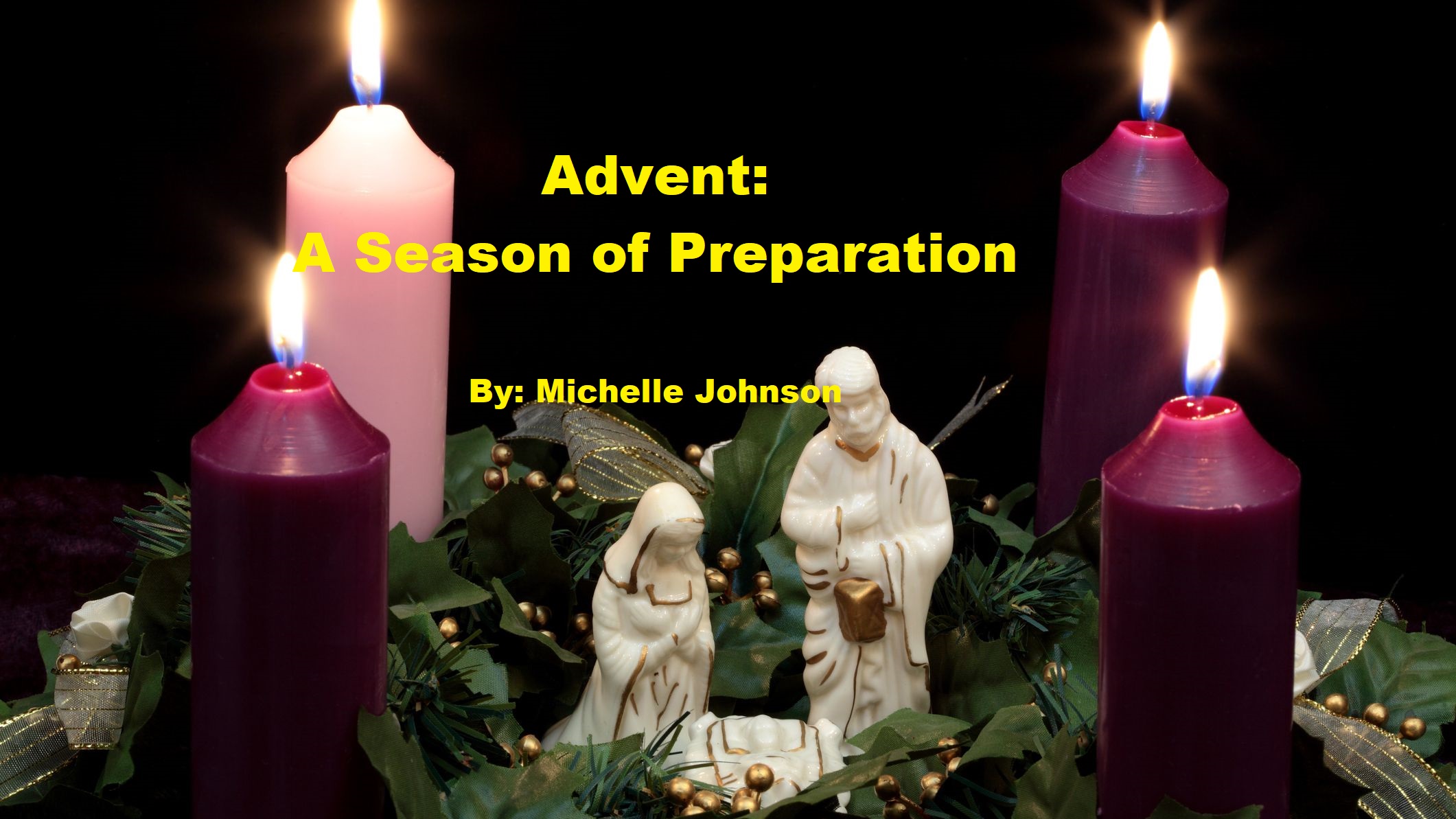By: Michelle Johnson | November 28, 2021
There are lists on my kitchen counter. There are lists in my planner. It is the week of Thanksgiving, and it feels like the beginning of a six-week season of preparation for one thing or another. There are meals, gifts, events, greeting cards, and gatherings that all need to be prepared. There are lists of groceries, presents to purchase, and wrap, household chores to be done, and oh yes, there are Christmas decorations to be brought out of storage, and trees that need to be assembled, ornamented, and lit. There is much to prepare.
Between Thanksgiving and Christmas, on the church calendar there lies another event – Advent. Depending on your church tradition (or unfamiliarity with the Christian faith) you might be asking ‘what is Advent?’ It’s a great question and a timely one to ask, as this Sunday, November 28th, marks the first Sunday of Advent this year.
Advent comes from the Latin word adventus, which means “coming” or “arrival”. Advent is a season of anticipation or preparation for the arrival of Christmas, the day which remembers the birth of Christ Jesus. The church has a fairly lengthy history of celebrating Advent. The first time we find evidence of an Advent season is in the fourth century. Early Christians marked the Advent season (the weeks leading up to Christmas) with prayer, fasting, and pondering the incarnation of Jesus.
Over the centuries, how Advent was observed has changed some. The church in the West typically designates the four Sundays prior to Christmas as the Advent season. The middle of November is the beginning of the season for the Eastern church. Whereas the early church fasted as a means of observing Advent, today, sermons and scripture readings focused on preparation and anticipation are more common.
Your experience with Advent will probably depend upon your church tradition. Churches that are more liturgical follow an annual Christian church calendar which includes Advent. This season will be a more formal time of pondering one’s own sin and the hope of salvation made possible by Jesus. My own experience is with less liturgical churches that included a more informal Advent season. Typically, our church would have a wreath with five candles and each week a family would be asked to read a scripture passage that was related to the Christmas season and then light one of the candles as part of our worship service. Each of the candles has a specific meaning. There are four candles intended to be lit on each of the four Sundays leading up to Christmas. Depending on which source you check the candles mean the following: candle one is the hope candle, two is either the love or faith candle. The third candle is joy and number four is either peace or purity. The fifth candle, which occupies the center of the wreath is known as the Christ candle. The last one is lit on Christmas.
Beyond the walls of the church, there are several Advent resources or items available today. The number of Advent-themed devotional books is rather larger. They vary in how many days (some are 25 days and some span the four weeks prior) are included in their season.
Which Scripture passages, readings, or prayers are suggested depends upon the author’s specific focus. A quick Google search of “Advent” or a walk through any retail store during November and early December points to a secular incursion into the season of Advent. There are advent calendars of all sorts that are now available. Often these include some small item (chocolate, a beverage, trinket, or candy) that is opened each day as the remaining days until Christmas are noted. Generally, there seems to be little in terms of anticipating the Savior of the world as much as answering the question ‘how much longer until Christmas?”
We have seen, Advent has been a part of the church for a very long time. The intent was generally focused upon a period of preparation for Christmas and the remembrance of Christ Jesus’ birth and anticipation of His second coming. Throughout history, the observance of Advent has changed some, the actual dates and activities involved are often dependent upon the church tradition in which one finds oneself. No matter the style of Advent observation, the idea of preparation for or anticipation of Messiah is still the common focus. Preparation, a word that occupied much of the opening paragraph. My life is full of preparations during this current season. However, the preparations on my to-do list are completely different from the preparations that characterize Advent. The preparation of the Advent season is about heart posture, not a to-do list. As Advent approaches, I am encouraged to set aside my lists and tasks to consider the focus of my heart, as I ponder both the first coming of Jesus, at that initial Christmas so many years ago, and anticipate His second coming. This preparation consists of time in God’s word and prayer, periods of confession of sin, and moments of praise and rejoicing over forgiveness and salvation. This preparation and anticipation will stand in stark contrast to the other preparations as dictated by the world this time of year.
About the Author
 Michelle Johnson is a Ph.D. student in the Theology and Apologetics program at Liberty University. She also earned her M.A. in Theological Studies and her M.Div. in Professional Ministries at Liberty University. Michelle graduated from the University of Minnesota with her undergraduate degree. She and her husband Steve live in Mankato, Minnesota, where she also serves in women’s ministries. In addition to her love of theology and apologetics, Michelle also has a passion for historical studies, particularly the theology of the Patristics. When she is not spending time reading or writing, Michelle can often be found dreaming of her next travel adventure or enjoying a great cup of coffee. Michelle serves as the General Editor of Bellator Christi Ministries.
Michelle Johnson is a Ph.D. student in the Theology and Apologetics program at Liberty University. She also earned her M.A. in Theological Studies and her M.Div. in Professional Ministries at Liberty University. Michelle graduated from the University of Minnesota with her undergraduate degree. She and her husband Steve live in Mankato, Minnesota, where she also serves in women’s ministries. In addition to her love of theology and apologetics, Michelle also has a passion for historical studies, particularly the theology of the Patristics. When she is not spending time reading or writing, Michelle can often be found dreaming of her next travel adventure or enjoying a great cup of coffee. Michelle serves as the General Editor of Bellator Christi Ministries.
Dive Deeper
Michelle Johnson, “Book Review: Another Gospel,” BellatorChristi.com (10/18/2021), https://bellatorchristi.com/2021/10/18/book-review-another-gospel/
Michelle Johnson, “Athanasius of Alexandria,” BellatorChristi.com (12/31/2020), https://bellatorchristi.com/2020/12/31/athanasius-of-alexandria/
Copyright, 2021. BellatorChristi.com.





